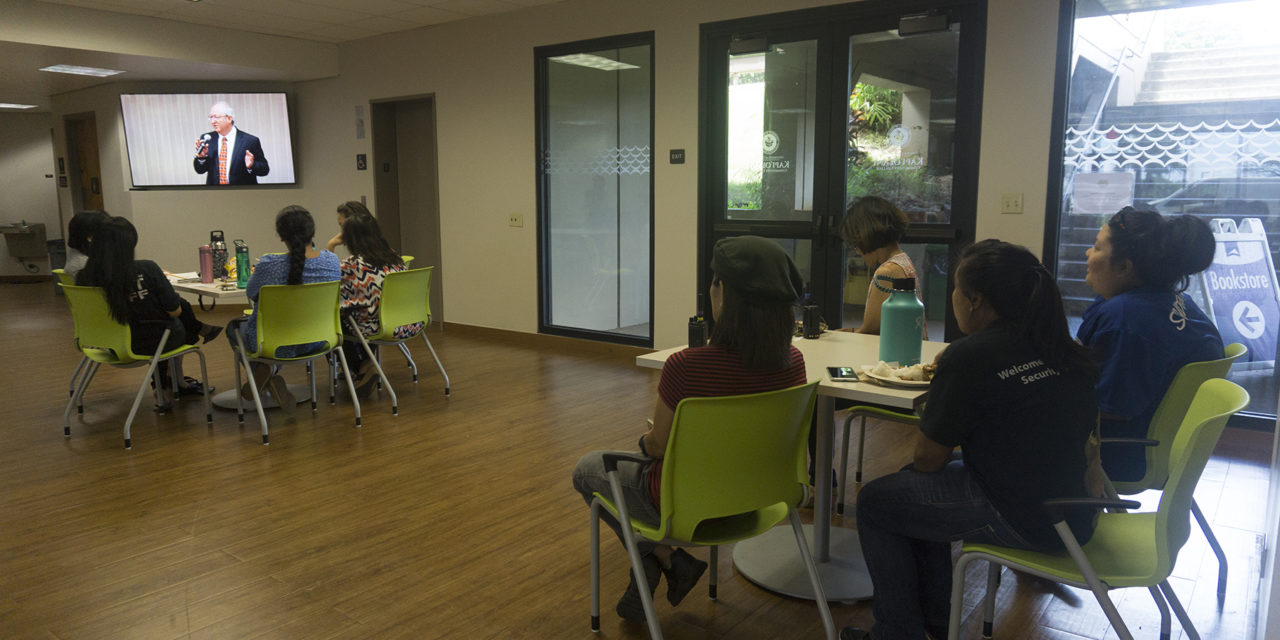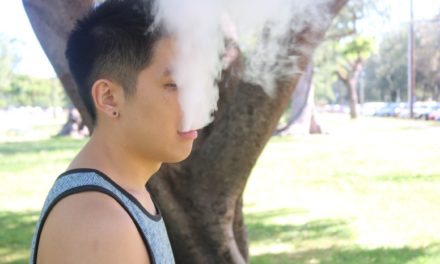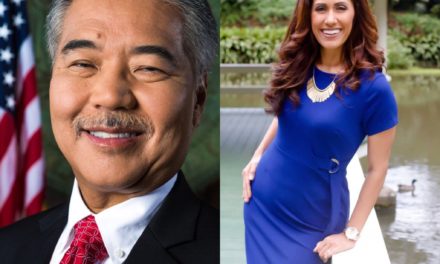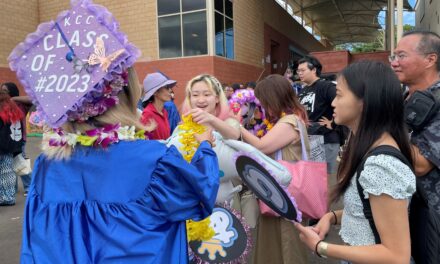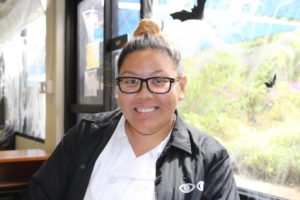By Mark Ladao | Staff Writer
The three finalists of the Kapi‘olani Community College chancellor search held an open forum Friday in ʻŌhiʻa Auditorium on campus to provide an opportunity for the public to get to know them.
After brief introductions, attendants were allowed to ask questions to the finalists for about an hour each. The forum ran from 11:30 a.m.-3 p.m.
The finalists are Louise Pagotto, interim chancellor for KCC; Micheal Glisson, vice chancellor for strategic initiatives at South Louisiana Community College; and Jeffery Thomas, dean of academic affairs at the North Campus and West Hills Center of the Community Colleges of Allegheny County.
Among the primary concerns of the roughly 75 people in attendance, most of whom were faculty or staff, were the finalists’ visions for KCC and their ability to promote trust between and among faculty members.
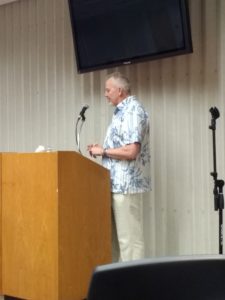
Jeffery Thomas answers questions at the open forum held at KCC. (Photo by Kapi’o staff)
Faculty members complained about responsibilities being unfairly distributed among certain faculty while others said they felt disenfranchised. Others complained about inability of some to respect faculty-set deadlines, which can in turn affect faculty, students and even KCC’s accreditation status. General mismanagement, which included having unpaid instructors on campus, and poor academic advising have also been issues.
Frustrations led to the ousting of Leon Richards, former chancellor of KCC, in May 2016 after the faculty senate passed a vote of no-confidence in him and asked for his removal. Since then, Pagotto has served as interim chancellor.
Hal Corcoran, assistant professor and program coordinator of Information Technology at KCC, vocalized his frustrations when Pagotto was fielding questions.
“Since Dr. Richards has left, it doesn’t seem like that much has really changed,” he said. “If you were selected and moved from interim to permanent chancellor, would you see yourself as an agent of change or more as kind of a caretaker for the existing system?”
All three candidates said the institution’s vision required working with faculty and students. Thomas said listening over time would lead to success, while Glisson said discussions were most important. Pagotto, who has worked at KCC for more than 30 years, hopes to make KCC a college people want to attend.
“My vision is to make KCC a destination, not a pass-through,” she said, “not only some place you go on your way to somewhere else … or go to a BA [Bachelor of Arts] institution somewhere else.”
In contrast to Pagotto’s idealistic vision of KCC, Glisson said he would focus on making it the best version of what it is–a community college.
“If we don’t transfer our students to the university to get their education, we’re failing our students,” he said.
Thomas noted his openness to campuses being “global.” He had an idea at CCAC that involved removing fake trees from campus grounds and replacing them with international flags.
He said, “Look at our physical space and say, ‘What do we want our physical space to say about us?’”
Another important issue presented to all the candidates was how they would respond to the unique demographic at KCC and in Hawaiʻi in general.
Thomas spoke about the work he has done with indigenous peoples at the colleges while serving as chair of social and behavioral sciences at Northland Pioneer College in Holbrook, Arizona, highlighting his work with different Native American groups.
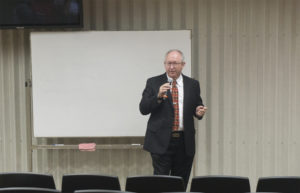
Micheal Glisson takes questions from the audience during the open forum for chancellor finalists at KCC. (Photo by Kapi’o staff)
“We had a lot of programming and a lot of interactions with those particular indigenous groups, including developing a heritage preservation program to train tribal members in heritage preservation,” he said.
Glisson pointed to his experience in Lafayette, La., where he worked at a minority-serving college by enrolling a certain percentage of minority students, saying colleges should represent their communities demographically.
“Diversity being met is when its college looks like its community,” he said, but emphasized that, for faculty, the best person for the job should take precedence over someone of a particular ethnicity.
Pagotto shared her decades of life experiences, which include hula, a career studying indigenous languages and time in Papua New Guinea and in Hawaiʻi.
“These life experiences shaped my vision for KCC to support and fully realize the stated mission of the college,” she said, “which is to serve as a model indigenous-serving institution whose graduates strengthen the social, economic and sustainable advancement of Hawai‘i and the world.”
Pagotto said she was criticized for not doing enough as interim chancellor, but said she was told to not make any major changes when appointed in 2016 by David Lassner, the president of the University of Hawaiʻi system. If chosen to be KCC’s permanent chancellor, Pagotto said she would provide the space to allow bigger changes to happen at the college.
Part of Glisson’s plan for success at KCC is to have himself and faculty show face beyond the campus, which would help attract donors. Glisson’s work ethic would involve constantly immersing himself in the community, saying he likes to “get his hands dirty.” This willingness to be active outside the campus is something he would expect from faculty as well.
Thomas focused on student engagement, which he said would be important for high-achieving students and those who want to be part of interest clubs.
“It’s a challenge, because all these are commuter institutions,” he said. “So, you have to have reasons for them to stay on campus, and a lot of that is through clubs.”
Jan Fried, a professor of American Sign Language at KCC, said that all the candidates were highly qualified to be chancellor but that Pagotto might be favored because she has “home-court advantage.”
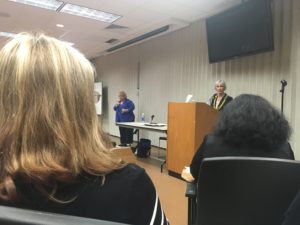
Louise Pagotto, KCC’s interim chancellor, speaks with faculty, staff and students during the open forum. (Photo by Mark Ladao)
“She’s been here, she knows the issues, she’s got the connections,” she said.
Corcoran appreciated Pagotto’s attitude toward major changes that the faculty as a whole seem to be clamoring for.
“I was encouraged by the fact that she seemed to be saying … that she would be willing [to make] major changes,” he said.
Fried suggested that the discontent among the faculty might hurt Glisson’s and Thomas’ chances, as faculty might be looking for immediate and significant change.
“I suspect that whoever takes this position is going to be expected to make change right away and they’re going to get judged harshly if they don’t,” she said. “It’s not going to be fair to someone new who doesn’t understand the culture of this place.”

